He notes that the COVID-19 pandemic has brought a lot of challenges to economies, notably the difficulty in tax recoveries by governments.
“The unprecedented COVID-19 pandemic continues to pose a devastating situation for health systems and national incomes globally,” the Sierra Leonean Priest says.
He adds, “Governments continue to strain their fiscal revenues as they implement emergency measures and recovery plans to sustain economies. This also has a significant negative effect on tax revenues, which provides a substantial source of revenue for most nations. Here in Sierra Leone, the pandemic has exacerbated an already dire tax revenue situation.”
The Caritas Freetown Director notes that building an effective tax system is among the most pressing challenges facing many states of the world.
According to the Priest, taxation provides the resources necessary to finance government activities and has equally important implications for economic growth, inequality and governance.
(Story continues below)
“Despite this reality, tax debates have tended to remain the preserve of a narrow, technocratic elite, while broader, popular engagement has remained very limited,” Fr. Konteh says.
He says that debate about tax issues has tended to focus on generating additional revenue “in a way that is also supportive of economic growth.”
“This is a hugely important goal, but it is equally important to focus on building tax systems that are fair, transparent and inclusive,” he says, and adds, “These goals are important in order to encourage broader development gains, and because they are essential to enhancing tax compliance and the legitimacy of the tax system.”
The Priest regrets that African countries endowed with a large amount of natural resources are among those with the highest poverty levels, a situation he refers to as “the paradox of plenty.”
“Natural wealth in highly-valued raw materials such as iron ore, gold, diamonds, rutile, copper, or bauxite, which should boost economic development and reduce poverty, has in fact in many countries given rise to poverty, inequality, weakened public services, and stunted economic growth,” he says.
“This is known as the ‘resource curse’ or the ‘paradox of plenty’. The phenomenon cannot be explained solely by the abundance of natural resources. It is essentially due to the links between excessive economic dependence and the policies related to the sharing of profits, and the social and environmental costs involved in the exploitation of such resources,” Fr. Konteh explains.
He reiterates Oxfam’s suggestions for improving the opportunities offered by revenues from extractive industries.
The opportunities include upgrading legal and fiscal frameworks in poor countries with natural resources, renegotiating contracts with big extractive companies, and putting in place or reinforcing public financial management systems.
“These systems should prioritize the use of extractive revenues for social spending, as well as for setting the foundations for the diversification of production, for job creation, and to mitigate the social and environmental impacts of exploitation,” the Director of Caritas Sierra Leone asserts.
Agnes Aineah is a Kenyan journalist with a background in digital and newspaper reporting. She holds a Master of Arts in Digital Journalism from the Aga Khan University, Graduate School of Media and Communications and a Bachelor's Degree in Linguistics, Media and Communications from Kenya's Moi University. Agnes currently serves as a journalist for ACI Africa.








